
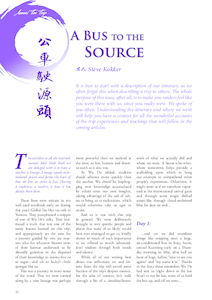 |
|
The antidote to all the internal, mental blah blah blah we are deluged with is to have a teacher, a lineage. Lineage equals accumulated power and forms the basis of how we live, or strive to live. Having a tradition, a teacher, is how it has always been done.
Those lines were written in my well-used notebook early on during this year's Global Tea Hut tea trek to Yunnan. They paraphrased a snippet of one of Wu De's talks. They intimated a truth that was one of the many lessons learned on this trip, and appropriately set the tone for a journey guided by two tea masters who for whatever bizarre twist of their karmas undertook to be absurdly generous in the dispersal of their knowledge to twenty-five or so eager - and oh so lucky! - little sponges like us.
This was a journey in every sense of the word. That we were carried along by a wise lineage was perhaps more powerful than we realized at the time, so fun, human, and down-to-earth as it also was.
As Wu De added, students should advance more quickly than the teacher. We should be leapfrogging over knowledge accumulated by others onto our own insights, taking advantage of the toil of others to bring us to realizations, which would otherwise take us ages to attain.
And so it was with this trip in general. We were deliberately brought to very specific people and places that none of us likely would have ever managed to get to, kindly shown so much of such importance to us, offered so much advancedlevel wisdom through both words and silence.
While all of our writing here about our reflections on and lessons from the trip will unveil some fraction of the trip's deepest essence, for the sake of context, let's walk through a bit of a timeline/framework of what we actually did and where we went. A linear who-whatwhere sometimes helps provide a scaffolding upon which to hang our attempts to comprehend other people's experiences. Otherwise, it might seem as if we somehow vaporized at the international arrival gates and through some magic drifted steam-like through cloud-enshrined bliss for days on end...
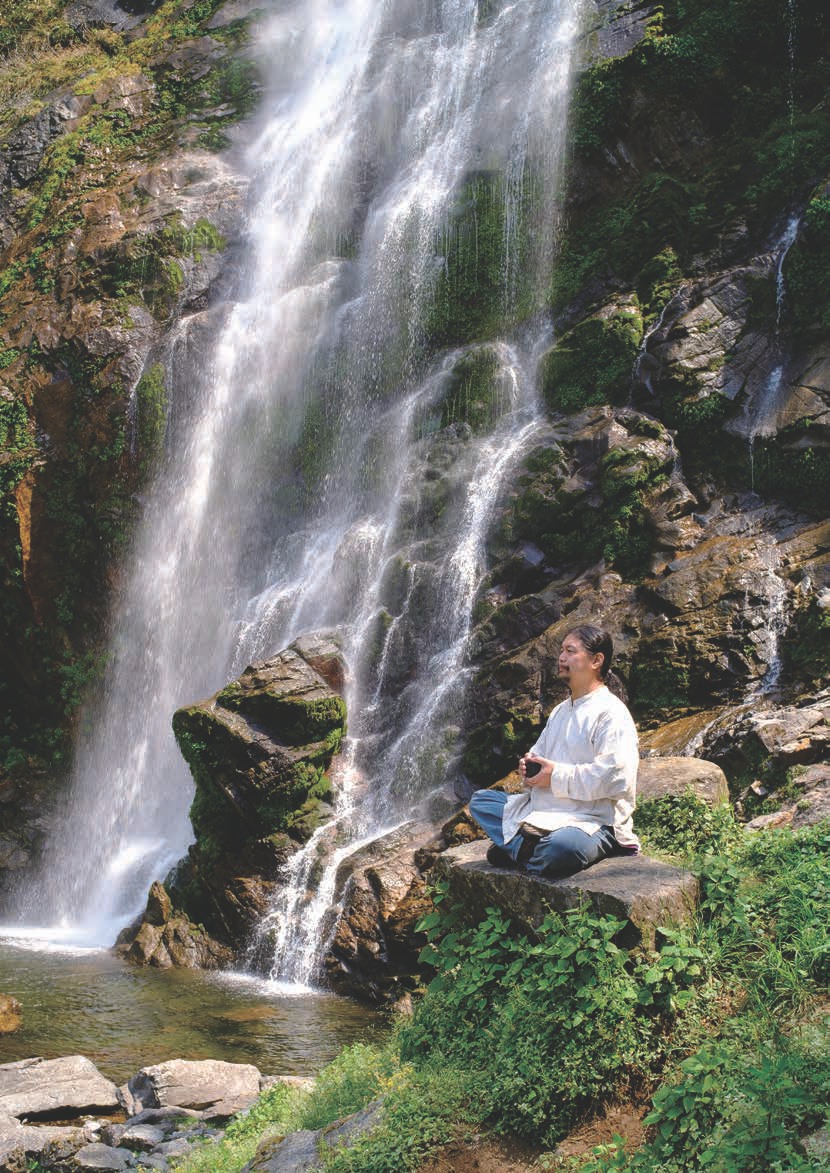
...and yet we did mundane things like stepping onto a large, air-conditioned bus in busy, hectic central Kunming early on a Thursday morning in May, after half an hour of hugs, hellos, "nice to see you agains" and "my name is'es." Thanks to the forty-three reminders Wu De had sent us (right down to the last hour) to not be late, none of us held the bus up, and off we went...
The entire day we drove, getting to know our neighbors over the course of the thirteen-or-sohour drive, which included pee & stretch stops, and a few extended eating stops. The province of Yunnan is almost 39,5000sq km in area (which is slightly smaller than California, more than one and half times the size of the United Kingdom, or nearly double the size of the Australian state of Victoria). It's big. And mountainous. Which makes travel times and distances enormous, as well as breath-takingly beautiful to traverse, being constantly surrounded by towering rocky landscapes and rust-red earth.
We were headed to the village of Qian Jia Zhai ("1000 family village") in the Ai Lao mountain range. Ai Lao, too, is a huge expanse, stretching over 1,740sq km and sitting at the intersection of the Qinghai/Tibetan plateau, the Hengduan mountain range and the Yunnan high plateau. Its highest peak is 2,811m (which in Yunnanese terms is kinda not-so-impressive; it's only the fifteenth-highest peak in the province!). Our destination was a newly-built guesthouse/tea-processing facility run by our host Auntie Ai and her radiant family.
By the time the bus had rounded its four hundredth twist up bending mountain roads in the encroaching darkness and past the millionth treerock ensemble, we were all quite anxious to arrive. As I had been there two years prior, a few people were asking me, "Is this scenery ringing any bells? Are we getting close?"
We arrived, stiff-backed but excited as puppies, to smiles, hosts dressed in colorful costumes, fresh air, a sky full of stars, and many plates of fresh fruit and snacks... and just in time, it turned out, for a tea session. Sleep came fast and deep an hour or so later, each of us paired up and in our own comfy rooms. Queries of "Does your room have a squat toilet too?" could be heard wafting through the halls.
One evening, close to sundown, the Ku people chased a fat deer deep into the forest. Eventually, the deer outran them. When they'd caught their breath, they realized they were lost. Worse yet, a dangerous storm was brewing. The eldest had an idea to climb a tree to look around, hoping to get some bearings. He volunteered to climb, but one of the younger hunters insisted. He climbed up an old tree and looked around, but there was only a sea of green in all directions. The dark sky made him anxious, so he nervously plucked one of the leaves from the old tree and started chewing on it. His whole body filled with bitterness and he thought he was poisoned. He spat and choked, and his tribesmen below were worried he was dying. Then, his face changed and he shouted, "I've found it! I've found it!" He fell out of the tree, he was so excited! Now, his mouth was filled with a sweet aftertaste. His energy was full and his eyes bright as the stars. He got up and smiled, again exclaiming, "I've found it!" His tribesmen looked on in amazement. "What did you find?" they asked. "I can see the way home now - see it through the heart!" Everyone started chewing the leaves from the wise old tree, and with renewed energy and clear hearts, they made it home safely before the storm, carrying knowledge of this new powerful medicine with them.
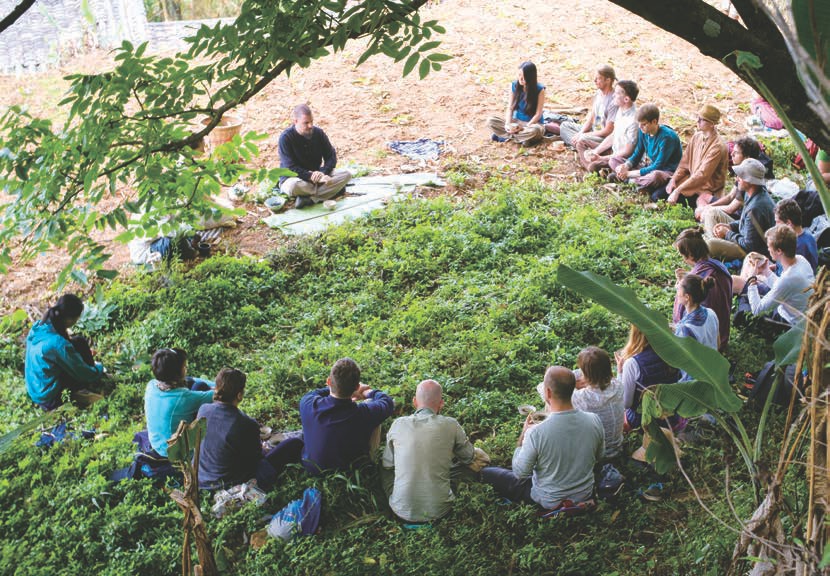
The morning arrived for all of us with a shockingly stunning sight outside our windows: verdant mountains stretching their sides towards the blazingly sunny sky and clouds above, for as far as the eye could see, with signs of animal and human life buzzing everywhere.
These first few days, we were all feeling each other out, rekindling paused friendships, tentatively establishing new bonds, and slipping out of the busy-ness and possibly stressful lives from which we had all come, as well as shaking off jet lag.
Our days in and around the village were full, vibrant, punctuated three times a day (at least) with mega-portions of freshly prepared Yunnanese cuisine. While we couldn't get permission this time to trek through ancient forests to visit the 2700-year-old King Tree, we did get a live lesson by Wu De and Master Tsai surrounded by old tea trees of various subspecies and had our first outdoor tea session by a stunning waterfall from which our drinking water was culled. What a treasure!
It delighted us all to be able to help process some stunning Ai Lao ancient tree maocha, after receiving rolling (ro nien) lessons from Auntie Ai and our two guides. We were all smelling each other's piles (of leaves, that is) and hands; just as each emptied tea cup smells different from one another, so too did the leaves after we had rolled them. I suppose I should have washed my hands after anointing them with sandalwood essential oil. Live and learn!
On our last night, not only were we treated to a culinary feast, but also to a dance presentation. Some two dozen locals had dressed up in full costume and came over just to help us party. We were all looking at each other, wondering what was happening and why such a fuss was being made over us. We were coaxed to join them in trying out the choreographed Ku Chuong folk dances. Even the shyest amongst us tried out the fancy (read: awkward) footwork alongside them, arm in arm. As if the show of hospitality from our host's side was not already overflowing, Auntie Ai also made us all traditional tea, and offered us cakes of precious tea to buy. Ah, and there was the local wild honey, too, which got me babbling excitedly.
As a group, by the end of our Ai Lao stay, we had relaxed into a new rhythm, had shaken off whatever tiredness or mind-based tensions had held us tighter than we needed to be and were already connecting with each other on a much more personal, honest level.
The fourth day was another mega bus trip, from morning until late in the evening, punctuated by pee breaks at gas stations boasting awkwardly-translated signs and equally incomprehensibly delicious food. It was an awesome bus ride, too, right through the military-patrolled borders of the southern prefecture of Xishuangbanna (a Holy Grail in and of itself for tea lovers). The relentless twists and turns down sharp, narrow corners atop perilous but stunning cliffs with pedalto-the-metal speed was enough for some of us to feel our lunchtime bok choi resurface at the back of our throats, but in the end, we all hailed the heroic stature of our driver, who had pulled off what none of us felt we could have ever done. And safely. And without complaint!
Indeed, one of the most touching aspects of the kindness we encountered everywhere was that there was never a sense that we were imposing or that all the time and effort expended on us was anything less than a genuine pleasure.
In total darkness, we reached the village of Jingmai in Lancang County of southern Puerh prefecture. We couldn't see much of it when we first arrived, but even by the smell, the unique look of the neat village itself, and an enveloping feeling in the air, we knew we were in another world. Feeling nestled in the embrace of something mysterious and larger than life, we fell into a deep sleep.
The three days in Jingmai were Heaven in a way many will doubtless describe in these pages. Our days were very, very full, and yet went by with the pace of a cool, confident swagger - the comfortable stride of someone fully in their element. We shared tea as a group in the lobby of our very tasteful guesthouse (some people had squat toilets, others had sit-down ones, I could glean from corridor conversations); we were fed almost constantly; and we received from the indefatigable Master Tsai soulful teachings about gongfu, chaxi and of course about the ancient forests. We were allowed to take an active part in the processing of tea, observing as leaves were withered, spread out, put through enzymatic deactivation and were rolled. We were treated to lavish dinners, some served by a bevy of folk-song-singing beauties doubling as waitresses. We visited a tea-processing factory and saw how puerh cakes are pressed (and got to swivel our hips while stone-pressing cakes - here we saw who got the funk and who hadn't, at least yet!). We learned how to wrap puerh cakes. We watched the sun rise over glorious distant mountains. We danced together; we ate still-warm, wild honey freshly cut from wild hives; and we laughed - a lot. Particularly memorable was the twenty-five-minute spontaneous and very trippy music and toning session we lapsed into, a vortex created by the now well-bonded group during one of our rare free times. Drums and voices, throat singing and toning merged in drone-like but mellifluous overtones and brought everyone into a state hard to achieve even in meditation.
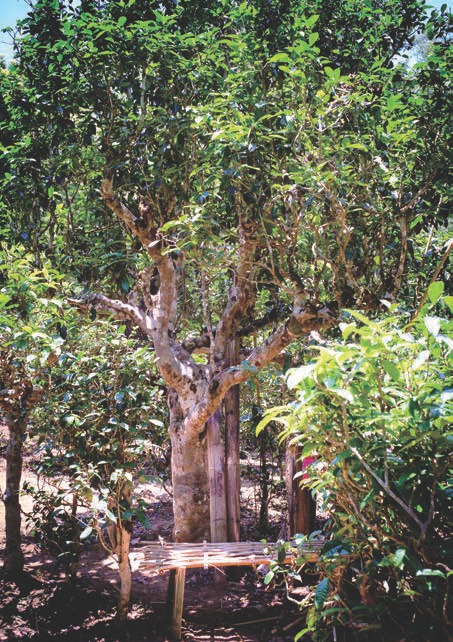
Most striking of all, however, in Jingmai were our three outdoor sessions among ancient tea trees: the raison d'être of the trip (or so it felt to us). Others will surely describe these as pivotal life-changers. There were profound moments of depth and peace where I felt myself to be Camelia sinsenis var. homo sapiens.
Here, the group was at its closest. In this otherworldly place, where we were profoundly moved and shifted on a daily basis, it became easier (natural!) to open ourselves to each other, expose fears and mini-demons, and be there for each other in those times of vulnerability. In the Global Tea Hut community, everyone is a healer in some sense, and so there were constant offers of oils, drops, ointments, pills, needles (acupuncture, of course), massages, and helpful suggestions all being freely exchanged. There were many instances in which one approached another in an offer of support, or gently encouraged another to sing, to come and dance, to hug, to be real in the witnessing presence of another human.
The accumulated knowledge of all us mini-masters was being offered out in life-affirming dollops. Beautiful! There were also many tears, truly meaningful hugs and some moments of dark realizations. Yet, all of this was contained and embraced by the spirit of the ancient tea trees, which never felt very far from us, and were powerful enough to absorb anything our troubled souls had to expunge.
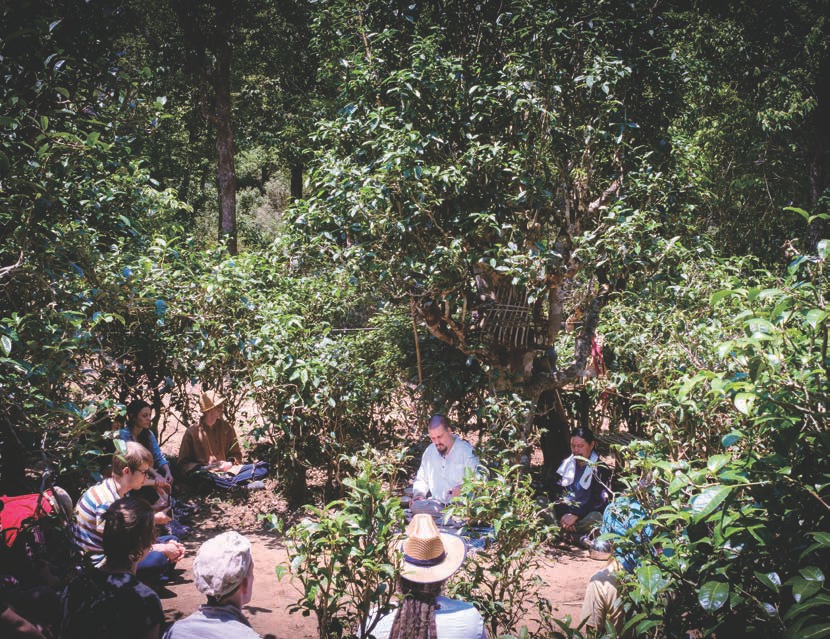
The distance from Jingmai to Kunming is about 450km - about the same as from Berlin to Frankfurt, a trip which would take five hours in Germany, but takes about twelve in Yunnan (ok, including mega eating bouts). Ours took us more than sixteen hours, including an unexpected four-hour pause on the highway as we very narrowly missed being part of a kilometer-long multiple-car crash. We made the best of it, continued having great talks and were able to pause and process the majesty of what we had just lived through. The girls peed in buckets and the guys exhibited their martial arts prowess; the natural order of things was restored.
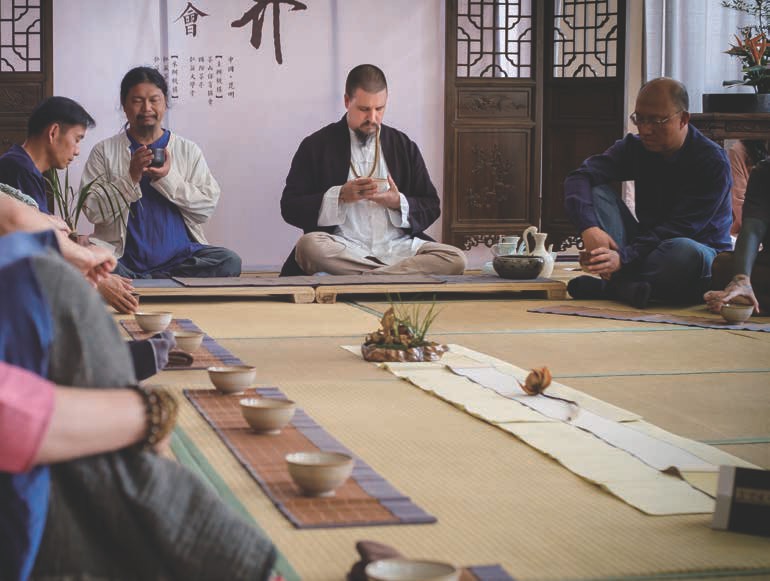
The last two days in Kunming provided an appropriate closing overture to our large orchestrated symphony. We were invited by Master Tsai to attend a tea service at the university where he teaches, a deeply touching event where both he and Wu De tearfully expressed some profound wisdom about the disappearance of Nature and the role of the heart in tea.
We also visited Wu De's beloved tea sister Shelley in her sumptuous teahouse, where we were served three jaw-dropping teas. It was also Ivan's birthday party celebration there, so we got to spoil him with attention and see him cut a triple-tiered cake.
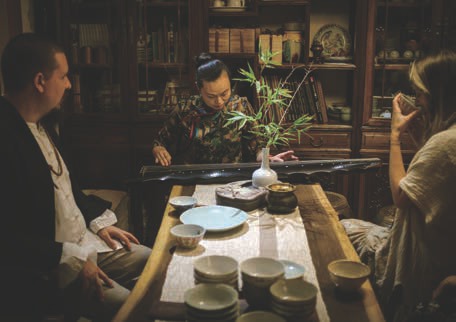
Our last day was also marked by a long final tea session in a central park, where we all sat in a large circle and, to the astounded, openmouthed gazes of passing locals, shared at least some of our feelings and reflections on the experiences we had just moved through, trying to do justice to the ineffable by using inadequate words...
It was obvious by this point in Kunming that we had left (what we took to be) Great Nature and were slowly stepping back into our city-life mode. Some of the micro-tensions in people's shoulders were slowly returning, as was the temptation to place old masks back on. Spontaneous hotel room dance parties helped keep the flow merry, but in the back of everyone's minds was the eventual return to Life As We Know It. A mostly unspoken melancholy was creeping into the hearts of some in the lead-up to an inevitable parting. Many were also craving some time to even begin absorbing what had happened and what significance it had in their lives, yet the pull of Life was already making itself felt. All was perfectly lovely, of course, but a journey of this emotional magnitude certainly carries with it a bittersweet closure.
Likely also, being mere mortals, we were somewhat unable to constantly access the calm, inner stillness and depths unlocked so powerfully by being in the presence of Great Nature. Indeed, one of the greatest challenges/opportunities this trip offered is to find a way to access at any time the lessons learned and the source of stillness revealed during our golden moments surrounded by wisdom in both plant and human forms.
Sitting among the woody sentinels of ultimate truth, on the land which first begat the tea tree on our planet, drinking of their nectar and being hypnotized by the insect and bird songs which have stimulated their growth for untold millennia, the trees began to feel like conscious beings, aware of our presence. With their eternal patience and compassion for the wandering restlessness of our minds, they gently asked if we were ready to shed some of the gathered dust and debris which stood in the way of our hearing their simple message to remember the essence of who we are as beings. With their myriad outstretched, twisted limbs forever moving in a slow, yet complex, hypnotic ballet that was frozen to us, they were like a multi-armed Hindu deity caught by a light flash in the middle of an exquisite dance. They gently whispered: "Leave only your conscious awareness. Let the rest fall, as we have done. Do not forget who you are. Dance your human dance and enjoy your senses." Ah, yes, let's, but let us not forget the very essence of our selves.
I wrote that in my notebook as well. Bowing in gratitude, I close my eyes and take a moment to rise to this challenge. As I bring this long article to a close, I dedicate this moment of peace I experience to the deeply stirring souls with whom I had the fortune of sharing this trip. I shall often recall the raw expressions of vulnerability and openness on your faces as you sat, bowls in hands, masks shed, and allowed others to take in the beautiful sight of humans open and present in their frailty, allowing the spark which animates your souls to be seen and held safely in the hands of others. Thank you.
